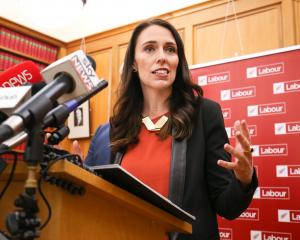Five weeks till the Budget. Much focus will be on the fiscal balance. But behind the scenes there has been an important change. Fitting the frame of that change was last December's Rebstock report on rescuing hard-done-by children, made public only on April 7.
It urged investment to get material change for those rescued. If, as recommended, a new agency secures effective and timely services for maltreated and neglected children, they might - should - get a better start in life.
We get our benefit later: children grown into adults who can integrate into economic and social life, bring up their own offspring well, pay taxes and not spend their lives on costly benefits, some with spells in costlier prison. This pay-now-get-the-goods-later way of doing government business is the rationale for Bill English's ‘‘social investment''.
There is a catch: while Mr English says there will be some new money in the Budget, most additional ‘‘investment'' funds will be scooped off other projects. The risk is that some others who need, but then don't get, public help will in effect be part-paying unless squeezed not-for-profit organisations (to be recruited through what the report, using tired ideology, calls ‘‘market-building'') can conjure more donations or investors.
A second risk is that too tight a focus on specific individuals can stigmatise, which can undo good work. A third risk is that the actuarial calculation of future fiscal liability that can be avoided, imported from ACC and the 2011 Welfare Working Group, becomes the objective, not just the measure. Nevertheless, the report promotes real change in children's lives.
If the Government actually does what the report says (Labour, which pushed a children's agency with wide powers in 2014, broadly says it should), those dealing with endangered and disadvantaged children will need to have done more than tick boxes.
Material change is the aim of a new tool used in this Budget round for around 70 projects. Officials have had to put these bids through a more complex cost-benefit process that requires a clear statement of the resultant ‘‘impact''.
This ‘‘CBAx'' process is a web-based interactive template that can project up to 50 years in calculating the net present value of an ‘‘investment''.
Officials initially bristled, in part because the original version was too complex and had to be detoxed. But some are said to have come to see it as a useful tool and it is likely to sharpen the 2017 Budget bids. Mr English looks to it to generate a common language which will enable better assessment of the relative value of different projects.
The template requires agencies to identify the ‘‘impacted'' people or cohorts and the time periods, including ‘‘counterfactuals'', if no or different action is taken. They must spell out assumptions (alternative discount rates to the Treasury's standard 8% can be tested) and quantify not just who gains and who loses in their sector but flow-on impacts on other agencies' sectors.
The expected impacts don't all have to be reduced to dollars. Agencies can try out scenarios. To do this effectively has required officials to satisfy the departmental science advisers established by chief science adviser Sir Peter Gluckman that the evidence stacks up. Many bids initially didn't, which says something about past policies. (Mr English talks of ‘‘rubbish''.)
The Rebstock report is founded on strong evidence. The expert panel included Ministry of Social Development science adviser Richie Poulton, who heads the four-decades-long repetitive analysis from birth of a Dunedin-born cohort.
That study has documented convincing correlations between early life and later troubles. Researchers in major global universities cite the Dunedin study. It is the subject of a four-part television documentary, taken up by channels in 75 countries and due to screen here from late May. The CBAx is not headline stuff.
But it is an element in a significant shift on Mr English's watch in the way the Government does its business - potentially helpful also to future alternative governments wanting credence. Mr English expects it to generate more ‘‘investible'' propositions.
And it might help restore mana to the Treasury as what one official calls a steward of the state sector and public system, a role its critics were saying a few years back it had lost.
It was such a leader in the 1980s. Radical policy change resulted. The economic and social policies it is exploring now are very different from those of the 1980s, so much so that Labour, the Greens and New Zealand First might, in time, recalibrate their discomfort with and scepticism of the Treasury.
That could turn out to be Mr English's legacy. On Budget day the fiscal numbers will be headlined but the real brief for a government, as the people's collective agent, is to contribute to changing people's lives for the better - and for that the evidence needs to be tough.
The Rebstock report, the CBAx and the science advisers are steps down that path.
●Colin James is a leading social and political commentator.












